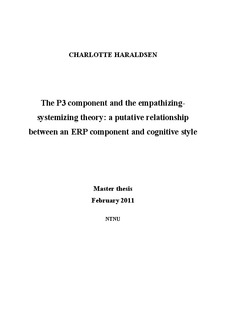| dc.contributor.advisor | Hollup, Stig Arvid | nb_NO |
| dc.contributor.author | Haraldsen, Charlotte | nb_NO |
| dc.date.accessioned | 2014-12-19T14:41:51Z | |
| dc.date.available | 2014-12-19T14:41:51Z | |
| dc.date.created | 2011-04-04 | nb_NO |
| dc.date.issued | 2011 | nb_NO |
| dc.identifier | 408361 | nb_NO |
| dc.identifier.uri | http://hdl.handle.net/11250/270589 | |
| dc.description.abstract | Males and females are found to perform differently in a number of areas, and studies of gender differences in behaviour and cognition are popular areas of research. The empathizing-systemizing theory (E-S theory) claims that males and females differ in their cognitive styles. Females are often found to be more empathizing, while males are often found to be more systemizing. Based on previous research in the areas of cognition and neuroimaging there seems to be common brain areas responsible for empathizing, systemizing and the generating of the P3 component. The main focus of this study is to investigate whether there are correlations between the latency and the amplitude of the P3 component, and the degree of empathizing and systemizing. To investigate gender differences, the empathy quotient (EQ) and the systemizing quotient-revised (SQ-R) were used. The P3 was found using the visual continuous performance test (vCPT) in a qEEG paradigm. A correlation analysis revealed gender differences. For males it was found a relationship between higher EQ score and longer P3 latency. For females a relationship was found between higher SQ-R score and longer P3 latency. Further analysis revealed that the P3 latency could explain nearly 50 % of the variance in the questionnaire-scores. The results indicate that gender differences in preference for cognitive styles may be physiological based, in that males use their cognitive resources more efficient when systemizing, and females more efficient when empathizing. This study lends further support to the notion that males and females seems to at least in part use different strategies when empathizing and systemizing, in that it is more cognitively demanding for a male to be empathizing, and for a female to be systemizing. | nb_NO |
| dc.language | eng | nb_NO |
| dc.publisher | Norges teknisk-naturvitenskapelige universitet, Fakultet for samfunnsvitenskap og teknologiledelse, Psykologisk institutt | nb_NO |
| dc.subject | Social and Behavioural Science, Law | en_GB |
| dc.title | The P3 component and the empathizing-systemizing theory: a putative relationship between an ERP component and cognitive style. | nb_NO |
| dc.type | Master thesis | nb_NO |
| dc.source.pagenumber | 47 | nb_NO |
| dc.contributor.department | Norges teknisk-naturvitenskapelige universitet, Fakultet for samfunnsvitenskap og teknologiledelse, Psykologisk institutt | nb_NO |
